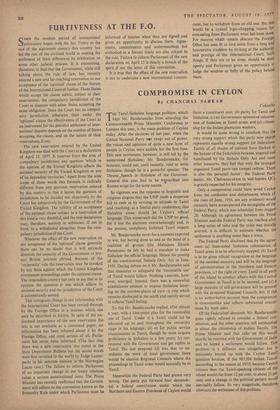COMPROMISE IN CEYLON
By CHANCHAL. SARK AR MHE Tamil-Sinhalese language problem, which I kept Mr. Bandaranaike from attending the Commonwealth Prime Ministers' Conference in London this year, is the main problem of Ceylon today. After the elections of last year, when the United National Party was swept out of power, the voices and opinions of quite a new layer of people in Ceylon were audible for the first time. This new movement, however, is still led by the westernised Sinhalese; Mr. Bandaranaike, for instance, could not, until recently, read or write Sinhalese, though he is a powerful speaker. The Throne ,Speech in Sinhalese of the Governor- General this year had to be transcribed into Roman script for the same reason.
So vigorous was the response to linguistic and religious slogans that the UNP made a desperate bid to cash in by revising its attitude to Tamil and resolving, at a fateful party conference, that Sinhalese alone should be Ceylon's official language. This somersault did the UNP no good, for it lost the elections overwhelmingly and, in the process, completely forfeited Tamil respect.
Mr. Bandaranaike never for a moment expected to win, but having done so and as the head of a coalition of groups (the Mahajana Eksath Peramuna) he felt he had a mandate to make Sinhalese the official language. Hence the passing of the controversial Sinhala Only Act in June, 1956. During debate on it Mr. Bandaranaike said that measures to safeguard the 'reasonable use' of Tamil would follow. Nothing concrete, how- ever, emerged. Instead, there was a somewhat exhibitionist attempt to impose Sinhalese letter- ing on the number-plates of cars—a rule which remains disobeyed in the north and merely served to inflame Tamil feeling.
To this Mr. Bandaranaike replied, after almost a year, with a four-point plan for the reasonable use of Tamil. Under it a Tamil could (a) be educated up to and throughout the university stage in his language; (b) sit for public service examinations in Tamil, though he must acquire proficiency in Sinhalese in a few years; (c) cor- respond with the Government and get replies in Tamil. His last proposal (d) was that to co- ordinate the work of local government there would be elective Regional Councils where the proceedings in Tamil areas would naturally be in Tamil.
Meanwhile the Federal Party had grown very strong. The party put forward four demands: (a) a federal constitution under which the Northern and Eastern Provinces of Ceylon would Colombo form a constituent unit; (b) parity for Tamil and Sinhalese; (c) no Government-sponsored colonisa- tion of Sinhalese in Tamil areas; and (d) citizen- ship for the Indian plantation workers.
It would be quite wrong to conclude that the very strong support which this party now enjoys represents equally strong support for federalism. Tamils of all shades of opinion have flocked to the banner of the Federalists because, angered and humiliated by the Sinhala Only Act and some other measures, they feel that only the strongest organised Tamil party can compel redress. There is also the personal factor : the Federal Party leader, Mr. Chelvanayakam (a well-known QC), is greatly respected for his integrity.
Only a compromise could have saved Ceylon from the confusion and disturbances which . (if the riots .of June, 1956, are any evidence) would certainly have accompanied the satyagraha of the Federal Party, which was scheduled from August 20. Although an agreement between the Prime Minister and the Federal Party was reached after a long series of talks and the crisis was initially averted, it is difficult to estimate whether the settlement is anything more than a truce.
The Federal Party disclosed that by the agree- ment (a) State-aided Sinhalese colonisation of Tamil areas is to be effectively stopped, (b) Tamil is to be given oflicial recognition as the language of the national minority and will be the language of administration in the Northern and Eastern provinces, (c) the right of every Tamil in all parts of the island to conduct affairs with the Central Government in Tamil is to be secured, and (d) large measure of self-government will be granted with the proposed Regional Councils Act. If this is an authoritative account then the compromise is statesmanlike and reflects substantial conces- sions by both sides.
Of the Federalists' demands, Mr. Bandaranaike quite rightly refused to consider a federal con' stitution, and the other question still outstanding is about the citizenship of• Indian Tamils. The Prime Minister said that talks on this would shortly be resumed with the Government of India and he hoped a settlement would follow. This problem is a different one altogether but is intimately bound up with the Ceylon Tamil question because, if the 983,304 Indian Tamils (according to the census of 1953) became Ceylon citizens then the Tamil-speaking citizens of the island would rise from 12 per cent. to about 33 per cent. and a change in the political pattern would inevitably follow. Its very magnitude, therefore, obstructs the settlement of this problem. •






























 Previous page
Previous page